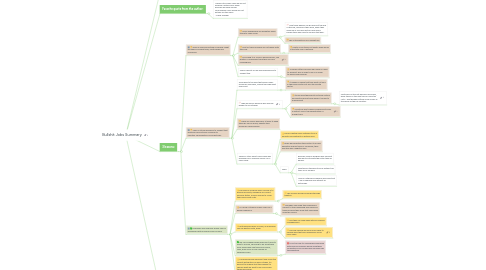
1. 1-Sentence-Summary:
1.1. Bullshit Jobs asserts that roughly two out of every five people are stuck in work that is bereft of purpose, and these workers could suffer psychological damage as a result.
2. Favorite quote from the author:
2.1. "Those critics who claim we are not working a fifteen-hour week because we have chosen consumerism over leisure are not entirely off the mark." - David Graeber
3. 3 lessons:
3.1. While a small percentage of people might be happy in bullshit jobs, most people are unfulfilled.
3.1.1. Some salespeople are deceptive while trying to make a sale.
3.1.1.1. How these people can go home at the end of the day, fulfilled in their work, when their measure of success rests on how many people they were able to deceive that day?
3.1.1.2. This is the epitome of a bullshit job
3.1.2. Most of them probably are not happy with their job.
3.1.2.1. Falsity is one thing, but what’s even worse is the total lack of purpose.
3.1.3. According to a YouGov polling survey, one quarter of Americans think their jobs are meaningless.
3.1.4. There is plenty of real world experience to support this.
3.1.4.1. Consider lottery winners who have no need to work yet feel an urge to do so in order to have some purpose.
3.2. There is strong evidence to support that politicians are actively colluding to maintain a proliferation of bullshit jobs.
3.2.1. According to the laws that govern basic economic principles, bullshit jobs shouldn’t even exist.
3.2.1.1. It makes no sense that they exist not only in the public sector but also the private sector.
3.2.2. Why would any business hire and pay people to do nothing?
3.2.2.1. It’s because there exists a strong cultural and political bias at work when it comes to employment
3.2.2.1.1. Politicians on the left demand more jobs, while those on the right call for more tax cuts – and thereby putting more money in the hands of the job creators.
3.2.2.2. A political bias towards employment plays a distinct role in the perpetuation of bullshit jobs.
3.2.3. There are clearly dynamics at work to keep these BS jobs in place, despite their economic inefficiencies.
3.2.4. There’s a story about Simon who was employed as a “problem solver” for a major bank.
3.2.4.1. Simon created some software to fix a security risk relating to a system error.
3.2.4.2. When he presented the solution to a bank executive and his team of 25 people, their reaction was a negative one.
3.2.4.3. Why?
3.2.4.3.1. Because Simon’s program was efficient enough to automate the entire team of people.
3.2.4.3.2. What would the executive do without his team of 25 flunkies.
3.2.4.3.3. He’d be nothing and appear less important – like a medieval lord without an entourage.
3.3. Employee and employer power can be rebalanced with universal basic income.
3.3.1. The idea of universal basic income is to provide all adults, regardless of current financial status, a basic income to cover their basic living costs
3.3.1.1. This income would be funded through taxation.
3.3.2. So much of today’s misery relies on a power imbalance.
3.3.2.1. Managers can make their employees subject to their degrading and ridiculous tasks because they know that employees need the money.
3.3.3. With universal basic income, an employee can say hasta la vista, baby!
3.3.3.1. And they can walk away with no financial consequences.
3.3.3.2. This way people would be more likely to choose work that was meaningful and of more value.
3.3.4. We can imagine people who don’t need to work to survive, choosing to do something more meaningful like teach pre-school, cook, drive a bus or any number of necessary roles.
3.3.4.1. t’s not as easy to comprehend someone with financial freedom doing something completely soul-sucking and mundane like telemarketing.
3.3.5. Considering how inefficient and unfair the current distribution of work is today, it’s difficult to imagine that the freedom to choose what we want to do could make things any worse.
